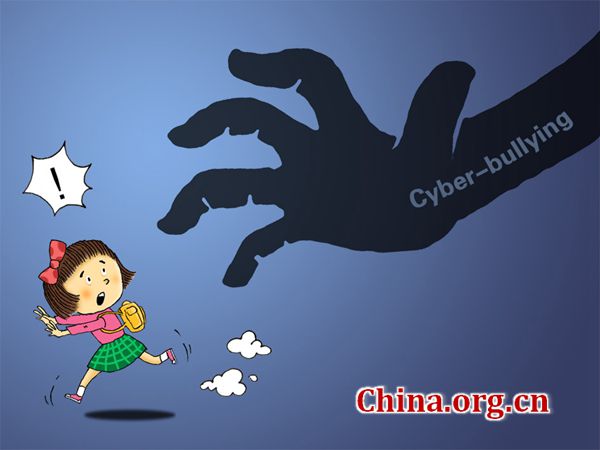Confronting the school bully in real and virtual communities
- By Eugene Clark
 0 Comment(s)
0 Comment(s) Print
Print E-mail China.org.cn, June 4, 2016
E-mail China.org.cn, June 4, 2016
|
[By Zhai Haijun/China.org.cn] |
China, in common with other countries around the world, is experiencing a disturbing increase in bullying among school aged children. Accordingly, China's State Council has issued a circular and launched a campaign to ask schools and other groups to take steps to redress the bullying in primary, middle and secondary vocational schools.
Bullying is a complex and multi-faceted problem. There are no simple fixes. As with most other human behavioral changes, a strategic and nuanced approach is required that takes into account the many factors and diverse context in which such bullying occurs.
As children have received a higher access to the internet and mobile devices, this bullying behavior has extended online especially with the growth of social media. Cyber bullying may involve any electronic communication expected to cause fear, intimidation, humiliation or distress to another person's health, emotional wellbeing or reputation. In some jurisdictions, not only children, but their parents may be held liable for not properly supervising their children and taking the reasonable steps to intervene in their child's bullying behavior. This legislation puts the burden on parents to prove they were actively supervising their child and that they had taken reasonable steps to stop their child's bullying behavior.
Education is also an important component in preventing bullying. Governments, school boards, communities and social agencies should take steps to promote safety at every opportunity to prevent bullying, cyber-bullying and related aggressive behaviors wherever they occur.
In terms of policy, education authorities should ensure that school codes of conduct cover bullying behavior, but also include opportunities for children to learn from their mistakes. Some experts have gone further and argued that students themselves should have a role in the development of policies and rules of conduct. Other school jurisdictions have standardized student computer usage agreements that include clearly defined consequences for misuse. Typically, these agreements are signed by students, their parents and teachers.
Operationally, school authorities should develop a standard to guide school administrators in dealing with bullying behavior. They should also determine what informal information to share when a student transfers between high schools, say from a rural area to an urban area.
School jurisdictions should create a clear mechanism for students to report bullying, a process for evaluation of that data and a student survey to be regularly executed every 2-3 years, to gauge the effectiveness of the reporting and evaluating methods.
School jurisdictions can teach students about the possible dangers of improper internet use and educational materials regarding cyber-hazards and responsible digital citizenship.
The growth in bullying also suggests the need for curriculum developers to place greater emphasis on social-emotional learning when reviewing and revising the curriculum.Children need to be taught safe internet and personal safety practices. They need to be encouraged to report offensive conduct and systems should be in place to make these reporting mechanisms work more effectively.
Technology is also part of the solution to bullying. Many jurisdictions are now monitoring social media in order to collect data and better support safe and responsible internet use among children. This software monitors what is publically posted and various algorithms can track and report online activity.
While schools focus on educating students, measures should also be taken to educate parents about the dangers of bullying, especially in relation to online behavior -- a context where many parents are unaware of what is going on in relation to their child's activities. School jurisdictions should create a digital and printed parents' guide to combating bullying and cyber-bullying.
Ultimately, bullying is a community problem and not just a school or family one. Evidence should be gathered regarding the quality of community relationships. Particularly, it is important that schools, parents, police officers as well as mental health and social workers and other community members work together in combatting this issue. The quality of such relationships and the importance of strengthening communities are key issues in addressing the bullying issue at its roots. In combatting the problem of bullying, ultimately the challenge is a community and cultural one. In this battle, results will matter more than good intentions. In the words of poet Kahlil Gibran, we each must begin to realize that, "The smallest act of kindness is worth more than the greatest intention."
Eugene Clark is a columnist with China.org.cn. For more information please visit: http://www.china.org.cn/opinion/eugeneclark.htm
Opinion articles reflect the views of their authors only, not necessarily those of China.org.cn.







Go to Forum >>0 Comment(s)